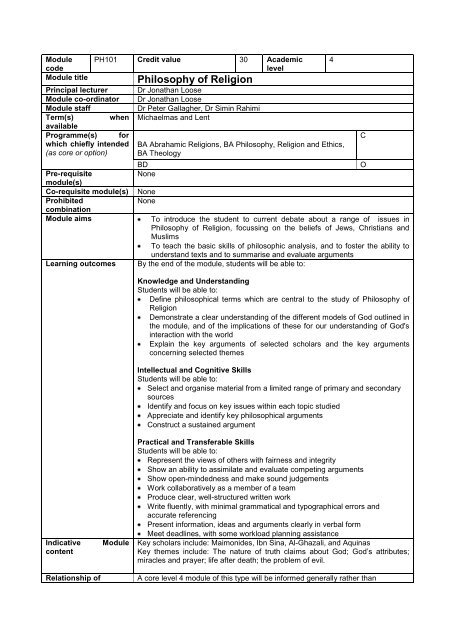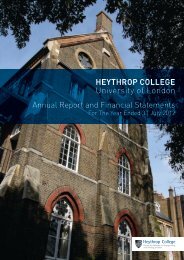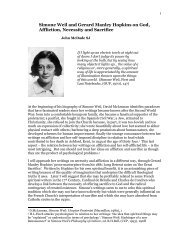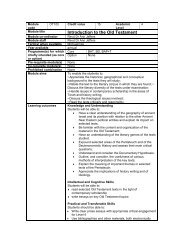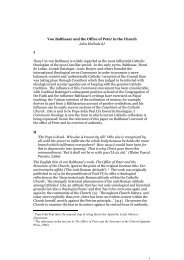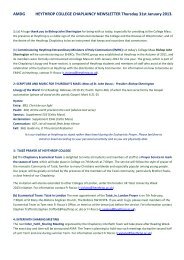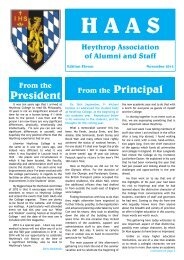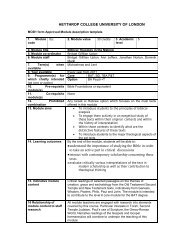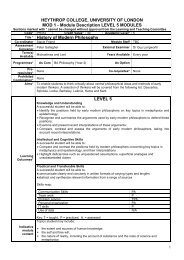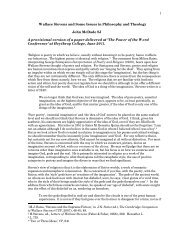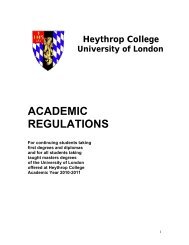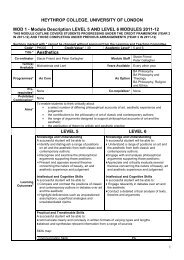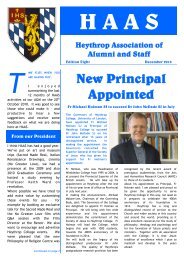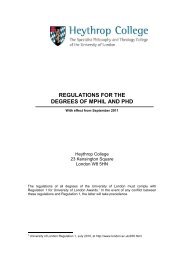PH101 Philosophy of Religion - Heythrop College
PH101 Philosophy of Religion - Heythrop College
PH101 Philosophy of Religion - Heythrop College
Create successful ePaper yourself
Turn your PDF publications into a flip-book with our unique Google optimized e-Paper software.
Module<br />
code<br />
Module title<br />
Principal lecturer<br />
Module co-ordinator<br />
Module staff<br />
Term(s) when<br />
available<br />
Programme(s) for<br />
which chiefly intended<br />
(as core or option)<br />
<strong>PH101</strong> Credit value 30 Academic<br />
level<br />
<strong>Philosophy</strong> <strong>of</strong> <strong>Religion</strong><br />
Dr Jonathan Loose<br />
Dr Jonathan Loose<br />
Dr Peter Gallagher, Dr Simin Rahimi<br />
Michaelmas and Lent<br />
BA Abrahamic <strong>Religion</strong>s, BA <strong>Philosophy</strong>, <strong>Religion</strong> and Ethics,<br />
BA Theology<br />
BD<br />
O<br />
Pre-requisite<br />
None<br />
module(s)<br />
Co-requisite module(s) None<br />
Prohibited<br />
None<br />
combination<br />
Module aims To introduce the student to current debate about a range <strong>of</strong> issues in<br />
<strong>Philosophy</strong> <strong>of</strong> <strong>Religion</strong>, focussing on the beliefs <strong>of</strong> Jews, Christians and<br />
Muslims<br />
To teach the basic skills <strong>of</strong> philosophic analysis, and to foster the ability to<br />
understand texts and to summarise and evaluate arguments<br />
Learning outcomes By the end <strong>of</strong> the module, students will be able to:<br />
Knowledge and Understanding<br />
Students will be able to:<br />
Define philosophical terms which are central to the study <strong>of</strong> <strong>Philosophy</strong> <strong>of</strong><br />
<strong>Religion</strong><br />
Demonstrate a clear understanding <strong>of</strong> the different models <strong>of</strong> God outlined in<br />
the module, and <strong>of</strong> the implications <strong>of</strong> these for our understanding <strong>of</strong> God's<br />
interaction with the world<br />
Explain the key arguments <strong>of</strong> selected scholars and the key arguments<br />
concerning selected themes<br />
Intellectual and Cognitive Skills<br />
Students will be able to:<br />
Select and organise material from a limited range <strong>of</strong> primary and secondary<br />
sources<br />
Identify and focus on key issues within each topic studied<br />
Appreciate and identify key philosophical arguments<br />
Construct a sustained argument<br />
4<br />
C<br />
Indicative<br />
content<br />
Relationship <strong>of</strong><br />
Module<br />
Practical and Transferable Skills<br />
Students will be able to:<br />
Represent the views <strong>of</strong> others with fairness and integrity<br />
Show an ability to assimilate and evaluate competing arguments<br />
Show open-mindedness and make sound judgements<br />
Work collaboratively as a member <strong>of</strong> a team<br />
Produce clear, well-structured written work<br />
Write fluently, with minimal grammatical and typographical errors and<br />
accurate referencing<br />
Present information, ideas and arguments clearly in verbal form<br />
Meet deadlines, with some workload planning assistance<br />
Key scholars include: Maimonides, Ibn Sina, Al-Ghazali, and Aquinas<br />
Key themes include: The nature <strong>of</strong> truth claims about God; God’s attributes;<br />
miracles and prayer; life after death; the problem <strong>of</strong> evil.<br />
A core level 4 module <strong>of</strong> this type will be informed generally rather than
module content to<br />
staff research<br />
Learning and teaching<br />
methods<br />
Essential texts<br />
Recommended texts<br />
specifically by staff research.<br />
A mixture <strong>of</strong> lectures, seminars, tutorials and revision sessions, together with<br />
appropriate reading and set tasks to enable students to apply the skills they<br />
learn.<br />
Essential readings may be accessed via the <strong>College</strong> Virtual Learning<br />
Environment.<br />
One introductory textbook and one collection <strong>of</strong> readings taken from the<br />
following lists:<br />
Introductory textbooks<br />
Clack, Beverley and Brian R. Clack, The <strong>Philosophy</strong> <strong>of</strong> <strong>Religion</strong>: a Critical<br />
Introduction (Cambridge: Polity Press, 2008) [ISBN 978-0-7456-3868-3].<br />
Davies, Brian, An Introduction to the <strong>Philosophy</strong> <strong>of</strong> <strong>Religion</strong> (Oxford: Oxford<br />
University Press, 2004) [ISBN 0-19-926347-7].<br />
Meister, Chad, Introducing <strong>Philosophy</strong> <strong>of</strong> <strong>Religion</strong> (Abingdon: Routledge,<br />
2009) [ISBN 0-415-40327-8].<br />
Peterson, Michael L., God and Evil: an Introduction to the Issues (Boulder,<br />
Colorado; Oxford: Westview Press, 1998) [ISBN 0-813-32849-7].<br />
Peterson, Michael, William Hasker, Bruce Reichenbach and David Basinger,<br />
Reason and Religious Belief: an Introduction to the <strong>Philosophy</strong> <strong>of</strong> <strong>Religion</strong><br />
(Oxford: Oxford University Press, 2003) [ISBN 0-19-515695-1].<br />
Zagzebski, Linda Trinkaus <strong>Philosophy</strong> <strong>of</strong> <strong>Religion</strong>: An Historical Introduction<br />
(Oxford: Blackwell, 2007) [ISBN 978-1-4051-1872-9].<br />
Collections <strong>of</strong> readings<br />
Adams, Marilyn McCord and Robert Merrihew Adams, eds, The Problem <strong>of</strong><br />
Evil (Oxford: Oxford University Press, 1990) [ISBN 0-198-24866-0].<br />
Davies, Brian, ed. <strong>Philosophy</strong> <strong>of</strong> <strong>Religion</strong>: a Guide and Anthology (Oxford:<br />
Oxford University Press, 2000) [ISBN 0-198-75194-X].<br />
Eshleman, Andrew, ed., Readings in <strong>Philosophy</strong> <strong>of</strong> <strong>Religion</strong>: East Meets<br />
West (Oxford: Blackwell Publishing, 2008) [ISBN 978-1-4051-4717-0].<br />
Frank, Daniel H., Oliver Leaman, and Charles H. Manekin, eds, The Jewish<br />
<strong>Philosophy</strong> Reader (London: Routledge, 2000) [ISBN 0-415-16860-0].<br />
Meister, Chad, ed., The <strong>Philosophy</strong> <strong>of</strong> <strong>Religion</strong> Reader. (Abingdon:<br />
Routledge, 2008) [ISBN 978-0-414-40891-2].<br />
Peterson, Michael, William Hasker, Bruce Reichenbach, and David Basinger,<br />
eds, <strong>Philosophy</strong> <strong>of</strong> <strong>Religion</strong>: Selected Readings (Oxford: Oxford University<br />
Press, 2007) [ISBN 0-19-518829-2].<br />
Stump, Eleonore, and Michael J Murray, eds, <strong>Philosophy</strong> <strong>of</strong> <strong>Religion</strong>: the Big<br />
Questions (Oxford: Blackwell, 1999) [ISBN 0-631-20604-3].<br />
Taliaferro, Charles and Paul Griffiths, eds, <strong>Philosophy</strong> <strong>of</strong> <strong>Religion</strong>: An<br />
Anthology (Oxford: Blackwell, 2003) [ISBN 0-631-21471-2].<br />
(Background reading)<br />
Students who have not studied <strong>Philosophy</strong> <strong>of</strong> <strong>Religion</strong> at A Level are<br />
encouraged to read Peter Vardy and Julie Arliss The Thinker's Guide to God<br />
(Alresford: John Hunt Publishing, 2003) during the first term.
Assessment Type <strong>of</strong> task Magnitude % <strong>of</strong><br />
coursework<br />
element<br />
Coursework element Summary <strong>of</strong> 1,000 words 20%<br />
primary text<br />
Essay 2,000 words 40%<br />
Essay 2,000 words 40%<br />
End <strong>of</strong> year element Examination 2.25 hours, three<br />
questions (one<br />
text-based and<br />
two essays)<br />
Feedback<br />
Weight within<br />
the module<br />
40%<br />
60%<br />
To pass a module, students must make a reasonable attempt at all assessment<br />
tasks, pass the end <strong>of</strong> year assessment, and achieve an overall module mark at<br />
least equal to the passmark.<br />
Coursework marks will be returned through the Virtual Learning Environment,<br />
and individual comments and guidance will be given.<br />
Academic tutorials are provided to discuss written coursework and to provide<br />
guidance to improve the written work. Formative feedback will normally be<br />
provided within three weeks <strong>of</strong> the due date for all students who submit on time.<br />
In module student<br />
evaluation<br />
opportunities<br />
Indicative student time<br />
allocation<br />
Date <strong>of</strong> module<br />
description<br />
development or<br />
modification<br />
In 2012-13 a pilot scheme is running for PRE, BAAR, and BASR programmes.<br />
Feedback on two <strong>of</strong> the essays will be given in a Small Group event.<br />
Informally in tutorials and in formal module evaluations.<br />
The teachers welcome comments, criticisms and questions.<br />
300 hours<br />
December 2010<br />
Updated and Approved September 2012


